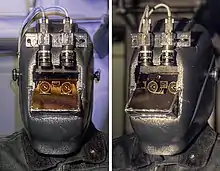计算机媒介现实
计算机媒介现实是通过可穿戴计算机或者便携仪器[1],如智能手机,从用户的视角加,减或操纵信息。一般来说,如EyeTap等的电子仪器或智能手机可以被用来实现对用户视觉环境的媒介。它可以像视觉过滤器一样在真实世界与用户视角之间工作。计算机媒介现实已经被用来帮助视觉障碍病人增强视觉能力[2]。这个例子使本可以直达用户眼睛的视频输入光线,通过计算机过滤成一个更有用的形式,从而实现了被媒介现实。它还被应用于相互交流的计算机接口[3]。用计算机媒介现实来移除或掩盖视觉数据,从而减少感官知觉,已经被用来应用在建筑,还有一些正在研究的领域[4]。对于其改变可观察现实的长期影响还没有被完全研究透彻,引发长期的副作用也不是没有可能的。



作为视觉辅助
在1970年和1980年之间,史蒂夫曼恩介绍了第一代与第二代的“数字眼镜”。从一开始,它就被当作帮助人们提升视力的视觉辅助,电焊头盔,[5][6][7][8]以及普通日常视觉辅助,就像在IEEE 科技与社会31(3)[9]以及标题为“玻璃眼睛” 的补充材料中提到的那样。[10] 在这一点上,媒介现实是一个合适的包含混合现实,延伸现实以及虚拟现实的超大集成体,同时它也包括被减弱现实。[11]
窗口管理者
一个常用的媒介现实的窗口管理者是“现实窗口管理者”[12]
无线媒介现实
蓝牙设备是常用于做媒介现实的[13]。用无线的通信,媒介现实也可以在不同的社区中成为一个通信中介[14]。 这样的互动叫做“seeing eye-to-eye(从眼睛里看见)”[15]。
应用
媒介现实的应用包括帮助人们提高视力的设备,游戏设备,器械维修设备,远程医疗,远程专家咨询,以及寻路设备等等。媒介现实也被运用在机器人[16],画图领域,比如“Loose and Sketchy”画图包[17].
相关理论
媒介现实有关的理论包括增强现实(一种特殊的媒介现实),虚拟现实,混合现实等等[18]。
引用
1. ^"Wearable,Tetherless, Computer-Mediated Reality", Technical Report #260, M.I.T. Medial Lab Perceptual Computing Section, Cambridge, Massachusetts, 1994
2. ^ Video mediation
3. ^ Grasset, R.; Gascuel, J. -D.; Schmalstieg (2003). "Interactive Mediated Reality". The Second IEEE and ACM International Symposium on Mixed and Augmented Reality, 2003. Proceedings. pp. 302–303. CiteSeerX 10.1.1.109.7275 . doi:10.1109/ISMAR.2003.1240731. ISBN 0-7695-2006-5.
4. ^ See, for instance, here and here Archived 2005-11-30 at the Wayback Machine.
5. ^ Quantigraphic camera promises HDR eyesight from Father of AR, by Chris Davies, SlashGear, Sep 12th 2012
6. ^ IEEE Spectrum
7. ^ IEEE Computer
8. ^ A magical welding helmet that lets you see the world in HDR–in real-time
9. ^ Through the Glass, Lightly, IEEE Technology & Society, Volume 31, Number 3, Fall 2012, pages 10-14
10. ^ "GlassEyes": The Theory of EyeTap Digital Eye Glass, supplemental material for "Through the Glass, Lightly", IEEE Technology and Society, Vol. 31, No. 3, Fall 2012
11. ^ Mann, S., & Fung, J. (2001). Videoorbits on EyeTap devices for deliberately diminished reality or altering the visual perception of rigid planar patches of a real world scene. Proceedings of the Second IEEE International Symposium on Mixed Reality, pp 48-55, March 14–15, 2001.
12. ^ Mediated Reality, by Steve Mann, Linux Journal, Article No5, Issue59, 1999march01, ISSN 1075-3583
13. ^ Mediated Reality Bluetooth Device Locator Archived 2011-07-06 at the Wayback Machine. by S Parikh et al., IEEE CSIDC 2002
14. ^ Guo, Z.; Zhu, J. J. H.; Chen, H. (2001). "Mediated Reality Bites: Comparing Direct and Indirect Experience as Sources of Perceptions Across Two Communities in China". Int. J. Public Opin. Res. 13 (4): 398–418. doi:10.1093/ijpor/13.4.398.
15. ^ Tang, F.; Aimone, C.; Fung, J.; Marjan, A.; Mann, S. (2002). "Seeing Eye to Eye: a shared mediated reality using EyeTap devices and the VideoOrbits Gyroscopic Head Tracker". Proceedings. International Symposium on Mixed and Augmented Reality (PDF). pp. 267–268. CiteSeerX 10.1.1.134.7981 . doi:10.1109/ISMAR.2002.1115106. ISBN 0-7695-1781-1.
16. ^ Daniel Suarez: Daemon: Bot-mediated Reality (discussion of Mediated and Augmented Reality, bots, etc.)
17. ^ Haller, M.; Landerl, F.; Billinghurst, M. (2005). "A Loose and Sketchy Approach in a Mediated Reality Environment". Proceedings of the 3rd international conference on Computer graphics and interactive techniques in Australasia and South East Asia. pp. 371–379. CiteSeerX 10.1.1.61.6181 . doi:10.1145/1101389.1101463. ISBN 1-59593-201-1.
18. ^ Mediated Reality with implementations for everyday life, Presence Connect, MIT Press journal PRESENCE: Teleoperators and Virtual Environments, Date Posted: 2002 August 6